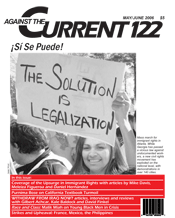Against the Current, No. 122, May/June 2006
-
A Gran Marcha and Beyond
— The Editors -
Plight of Young Black Men: The Scars and the Crisis
— Malik Miah -
The Sleeping Giant Awakes
— Meleiza Figueroa -
Immigrant Students and Workers Take to the Streets: Outpouring in Chicago
— Joseph Grim Feinberg -
A Test of Our Courage
— Mike Davis -
Textbook Tempest in California: Who Speaks for Hinduism?
— Purnima Bose -
Collective Action - and Victory! France: CPE Goes Down
— Robi Morder -
French Students Speak for Themselves What We Won—and Need
— Erwan, Florent, Gaby, Gaelle, Guillaume, Laetitia, Nina & Steven -
Fighting for Union Autonomy: Mexican Miners On Strike
— Dan La Botz -
Arroyo on the Brink
— Sonny Melencio -
After Katrina: A View from the Ground
— interview with Isaac Steiner -
New Legal Openings for Mumia Abu-Jamal
— Steve Bloom -
A Living Wage in London
— Jane Wills - War in Iraq: Withdraw Now?
-
Beyond Iraq: The Spreading Crisis
— David Finkel -
The Case for Staying in Iraq
— Kale Baldock -
Interview with Gilbert Achcar
— Susan Weissman -
Follies of the War
— David Finkel - Reviews
-
Feminism in Canada
— Cynthia Wright -
Interracial Antiracism
— Rachel Peterson -
A People's Science
— John Vandermeer -
Melville and A Lot More
— Paul Buhle - In Memoriam
-
Giants and Immortal Legacies
— George Fish
Paul Buhle
Herman Melville: Between Charlemagne and the Antemosaic Cosmic Man
By Loren Goldner
New York: Queequeg Publications, 2005 291 pages, $15 paperback.
MORE THAN A decade ago, an unpublished manuscript began filtering its contents into the minds of a fairly wide circle of erstwhile New Left intellectuals. It was fascinating, like no other theorizing on the text of Moby Dick and its significance; or rather, resembling many others in some of its evidence but ranging far beyond them in its implications.
Speaking for myself, I held onto these pages, pored over them every now and then. I wondered about its fate and I wondered about the author: Loren Goldner. Now at last, a portion of my wondering is over.
My own special fascination for this book (actually it bears a further subtitle: “Race, Class and the Crisis of Bourgeois Ideology in an American Renaissance Writer”) is rooted in the precursive scholar of Melville who matters the most to Goldner himself. I mean C.L.R. James, the Pan-Africanist revolutionary whose Mariners, Renegades and Castaways (1953) was published as James was about to be expelled from the United States. Until this barely-published and quickly obscure volume, Melville had been the subject of college lit-crit almost exclusively, and not too much of that.
In the decades afterwards, it was joked that seafaring as a New England trade had been replaced by Melville Studies. Not really, of course; but the dissertations seemed to be countless, let alone the essays for graduate and undergraduate school.
The search for the significance of Melville’s often arcane symbolism alone spawned hundreds of literary detectives. The political significance was also pursued, by a far smaller number, during the 1960s-’80s. Too often this exploration tended to reductionism or itself drifted off into deconstruction. A glance at “Herman Melville” on the Web will alert any searcher today to the vast, almost unbelievably complicated field of study.
But Loren Goldner, a political activist in a range of leftwing movements from the 1960s onward, has a unique angle. With copious footnotes, he reinterprets American Protestantism, the largely nonwhite seafaring workforce, the ship-as-factory (James’s own discovery), New England’s American Renaissance writers (and the sharp limits on their radicalism), contemporary art and philosophy and the Paris Commune, among other subjects.
In Moby Dick and other Melville writings, Goldner has found or created a world of his own interpretations. Page after page shows how the “Adamic” assumptions of the young United States, seeking to abandon and outstrip the limitations of older societies and cultures, ran square into them again — indeed had never avoided them, since slavery, genocide, exploitation and so on were inscribed in colonial and post-colonial development.
An attempt to summarize these insights would be useless, for they are to be reached one by one, finding the reader’s fascination with one subject or another. Like the novels of Wilson Harris, “the Caribbean James Joyce,” they yield themselves up best to re-readings, re-thinkings.
Harris once suggested that readers who found themselves puzzled with his work might well start at the end of his books and progress backward toward the beginning. I would propose letting the pages of this book fall open, so as to maximize the effect of Chance. Reader, you will not regret it.
ATC 122, May-June 2006

